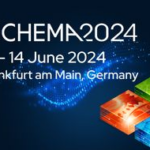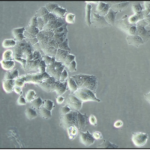Walther Trowal: A new era for high gloss polishing of ceramic surfaces
Vibratory finishing of ceramic components: Perfect surface finishes at surprisingly low costs
The recently developed polishing paste trowapast PKC produces flawless mirror finishes on ceramic work pieces with surface roughness readings of ra = 0.002 – 0.005 µm. These are values, which to date could only be achieved with costly manual polishing. The new finishing process opens entirely new surface finishing possibilities in the fields of decorative ceramics and medical engineering.
Mechanical high gloss polishing on metallic work pieces has been around for many years. To date similar finishes on ceramic components were considered as impossible.
But, because they offer a substantially higher wear resistance compared to metal alloys, the significance of ceramic materials has been growing steadily. When it comes to designer, optical and consumer products, high luster finishes are a key element for their market acceptance. But smooth, shiny surfaces also have a functional dimension for components requiring low frictional resistance. Ceramics made from zirconium provide the required hardness, but smoothing and polishing them by mechanical means was so far an unsolved problem.
Generally, mass finishing is a cost effective method for polishing of a variety of work pieces. The process usually starts out with an aggressive grinding powder followed by a polishing paste that creates a high luster on the work pieces. These polishing pastes contain extremely fine abrasive particles. Unfortunately, on very hard surfaces their material removal rate is often insufficient. For instance, creating a surface reading of ra = 0.02 µm would take such a long time that it would be absolutely uneconomical.
Walther Trowal offers a range of polishing pastes or powders containing minerals with different hardness values and initial grain sizes allowing a wide spectrum of polishing applications on all kinds of materials.
The secret: Sharp edges are becoming rounded
A suitable paste product for the economical polishing of ceramic had yet to be developed. Since for several industrial sectors in recent years this challenge had become more urgent, in 2012, a cooperative of eight companies and research institutes, among them Walther Trowal, was organized with the goal to develop a process for high gloss polishing of ceramics. The project, named KeraOpt, was financially supported by the „NRW-EU-Ziel 2“ fund for industrial research.
Within the group Walther Trowal assumed the task of developing a mass finishing process that allows creating the desired high gloss polishes on ceramic work pieces in a cost effective manner.
Another project of KeraOpt was the development of ceramic inlays for injection molds that produce very fine geometrical structures combined with extremely smooth surfaces.
After comprehensive test trials Walther Trowal could identify a mineral that is suitable for these kinds of applications: Besides producing high gloss polishes on metallic components, it also produces the same type of finish on zirconium ceramics. With the new polishing paste trowapast PKC Walther Trowal has at last a product that can successfully be used for high gloss polishing of all kinds of ceramic components.
The new polishing paste contains a mineral with a relatively large grain size with an initially very high grinding effect. During the process the mineral grains wear down to smaller sizes transforming the process from intensive grinding to fine polishing.
Angelika Helten, managing the chemical lab at Walther Trowal, explains why the new paste is so effective for polishing ceramic components: „The secret is that the PKC paste is changing its technical characteristics during the course of the finishing process. While conventional mineral grains are breaking up into smaller grains with sharp edges, the new minerals are becoming rounded. Expressed simply, they do not create micro scratches on the surface but truly polish, thus producing very shiny surfaces. The result, with surface readings of ra = 0.002 to 0.005 µm, has even surprised us.“
For the ceramic mold inserts mentioned above the same approach was taken that had proven so successful for polishing metallic surfaces. Since the removal rate on ceramic is lower than that on metal, the process lasts longer and requires two different ingredients. With an initial surface roughness of ra = 0.3 µm the first stage with a grinding powder takes about 20 hours. This is followed by a second stage with trowapast PKC that lasts about 40 hours.
The result: A member company in the KeraOpt cooperative now produces the mold inlays for plastic injection molding no longer with tool steel but with ceramic. The surface readings could be reduced from ra = 0.011 to 0.002 µm.
A real success story
Another member of the cooperative is also utilizing the new polishing technology. This company produces decorative components used in the interior of vehicles, for example, gear shifters and control elements for car radios and air conditioners.
All these components, for which the final customer demanded high gloss polishes, consist of zirconium ceramics. To date these parts had to be manually polished. Now, with trowapast PKC they can be mechanically polished with a fully automatic process.
The ceramic components undergo a 72-hour grinding process followed by a 48 hour polishing step and 2 hours for the final brightening. This results in absolutely scratch-free work pieces, which after a subsequent cleaning process can be directly installed.
Christoph Cruse, the general sales manager at Walther Trowal, sees significant advantages for the customers: „The duration of the finishing process may appear very long. But it takes place without any supervision and requires a minimum of operator intervention. Since the new process allows the treatment of batches of 5,000 pieces, the costs per piece a re significantly lower than before.
New possibilities
First feedback from the customers indicates that the new polishing process represents a significant progress towards creating smooth, shiny surfaces on ceramic components. It opens a brand new field of new applications, for example for producing
-Thread guiding parts for textile machinery
-Ceramic coatings of metallic components
-Orthopedic implants
-Components for optical electronics
-Mirrors
Walther Trowal offers interested companies to test the new technology at the Trowal test lab in Haan. This ensures that the technical specifications of potential users are met, before they have to make a purchase decision.
Since 1931 Walther Trowal is developing and producing modular as well as custom engineered solutions for a wide range of surface finishing applications.
Initially only making vibratory finishing equipment, over the years Walther Trowal has continuously broadened its product range and today offers a wide portfolio of equipment and services for improving all kinds of surfaces, e.g. mass finishing, part cleaning, shot blasting and drying of a wide spectrum of work pieces, last but not least, the coating of mass produced small parts.
Walther Trowal offers not only various types of equipment but complete surface treatment systems: By linking the various equipment modules and automating the complete process, we are able to precisely adapt our process technologies to the technical requirements of our customers. This also includes various types of peripheral equipment and process water cleaning and recycling systems. Of course, we also offer comprehensive pre- and after-sale service like sample processing in one of our demonstration labs and global repair and maintenance service.
Walther Trowal supplies customers in various industries around the world. These include automotive and aerospace, medical engineering and wind power generation.
Firmenkontakt
Walther Trowal GmbH & Co.KG
Georg Harnau
Rheinische Str. 35-37
42781 Haan/Germany
+49 2129.571-209
+49 2129.571-225
g.harnau@walther-trowal.de
http://www.walther-trowal.de
Pressekontakt
VIP Kommunikation
Regina Reinhardt
Dennewartstraße 25-27
52068 Aachen/Germany
+49.241.89468-24
+49.241.89468-44
reinhardt@vip-kommunikation.de
http://www.vip-kommunikation.de

